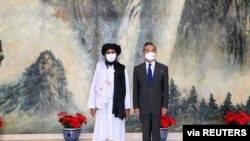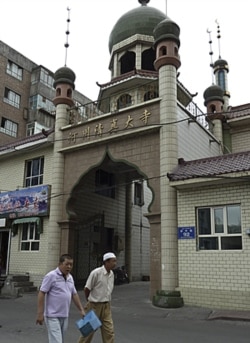The Taliban's return to power in Afghanistan comes just weeks after China's public expression of support for the insurgent group.
Experts say China is taking a pragmatic approach to Afghanistan, given its past record of engagement with the Taliban.
China was one of the few governments that reached out to the Taliban and established relations with it in the late 1990s, said Sean Roberts, a professor at the Elliot School of International Affairs at George Washington University in Washington.
China “started that process in about 1998, urging the Pakistan government, which is a close ally of China," Roberts told VOA. "And in 1999, the Chinese Foreign Ministry sent a delegation to Afghanistan to meet with top Afghan officials. And in 2000, the Chinese ambassador to Pakistan met with [then-Taliban leader] Mullah Omar."
Containing Uyghur militants
In those meetings, Roberts said, the two sides set up opportunities to help the Taliban government in Afghanistan with telecommunications and opened a flight route between Kabul and Urumqi, the capital of China's Xinjiang Uyghur Autonomous Region, where most of the population is Muslim and where China shares a 50-mile (80-kilometer) border with Afghanistan's Wakhan Corridor.
"And the Chinese state requested that the Taliban do anything in their power to ensure that there were no Uyghur militant groups in Afghanistan that could threaten China," Roberts told VOA. The Taliban had more or less ensured that the small group of insurgent Uyghurs from China who formed the East Turkistan Islamic Party, also known as the East Turkistan Islamic Movement (ETIM), was immobilized from that time onward, he said.
China's relations with Afghanistan since September 11, 2001, have been pragmatic and farsighted, said Hasan Karrar, a professor at the University of Management Sciences in Lahore, Pakistan.
"After 9/11, China extended tacit support to the Anglo-American-led offensive to oust the Taliban while maintaining that that retaliation must be in keeping with the U.N. Charter, and in which the Security Council must play a leading role."
Copper project
Raffaello Pantucci, a senior fellow at the S. Rajaratnam School of International Studies in Singapore and a senior associate fellow with the Royal United Services Institute in London, told VOA that the Chinese anti-Taliban push changed when China's state-owned company bid and won a $2.83 billion contract to exploit a copper mine at Mes Aynak, about 20 miles (40 kilometers) southeast of Kabul, in 2007.
Then, according to Pantucci, Beijing slowly became more open to engaging with the Taliban as a faction alongside the Afghan government. China continued to engage with both sides, waiting to see who came out on top, and "now is kind of a culmination of that hedging, which is basically continue to support whoever has taken control."
"To crystallize that in a way is the fact that a lot of attention was paid to the fact that Wang Yi met with Mullah Baradar in the very public meeting in Tianjin a few weeks ago," Pantucci said. "Before that, President Xi [Jinping] had actually called and spoken to President [Ashraf] Ghani and expressed his continued support for the Afghan government."
On July 28, when Chinese Foreign Minister Wang Yi met with the Taliban's co-founder and deputy leader, Mullah Abdul Ghani Baradar, in Tianjin, Wang pointed out that the Taliban are an important military and political force in Afghanistan, according to Chinese Foreign Ministry's website.
Wang also stressed that the Taliban would make a clean break with all terrorist organizations, including the ETIM, and resolutely and effectively combat them to remove obstacles.
ETIM is designated as an international terrorist organization, although the U.S. removed it from its terrorist list in November. According to a U.N. report in June, the Turkistan Islamic Party, also a widely accepted alias of ETIM, has several hundred members.
According to the Chinese Foreign Ministry's report, during the meeting, Baradar said the Taliban would never allow any force to use Afghan territory to engage in acts detrimental to China.
Two key issues for China
Mushahid Hussain Syed, chairman of Pakistan's Senate Defense and Defense Production Committee, told VOA that when it comes to Afghanistan, China has two issues that are important to both China and Pakistan.
"First, that Afghan soil should not be used against China," Syed said. "Secondly, when a new government formally takes over Kabul with the representation of Taliban, it is yet to be seen if they opt to become a part of the Belt and Road Initiative of China, of which CPEC [China-Pakistan Economic Corridor] is an integral part."
According to Monika Chansoria, a senior fellow at the Japan Institute of International Affairs in Tokyo, the perennial paranoia over anything that could stoke the flames of Islamic fundamentalism in Xinjiang continues to grip China's leadership.
"It also cannot be forgotten or ignored that the two-decade-long global anti-terror campaign following the 9/11 terror attacks on the U.S. were supplanted by China to conveniently channelize its domestic agenda of suppressing China's aggrieved and repressed Muslim population, namely the Uyghurs in Xinjiang," Chansoria told VOA.
The Chinese concerns and stakes will likely drive it toward "managing" the Taliban, Chansoria said. "The Taliban would seek to use China's 'veto' power to rescue it internationally. Besides, along with China, it would want to see the Taliban-Pakistan-China triangle emerge to drive the regional agenda, geopolitically and geoeconomically."
Beijing, quite palpably, will be sure to extract a quid pro quo from the Taliban in terms of guarantees in relation to Xinjiang, and it will look for unlimited access to Afghanistan's rich mineral wealth, which is geographically vital for the Belt and Road Initiative, according to Chansoria.
VOA's Urdu Service contributed to this report.
















